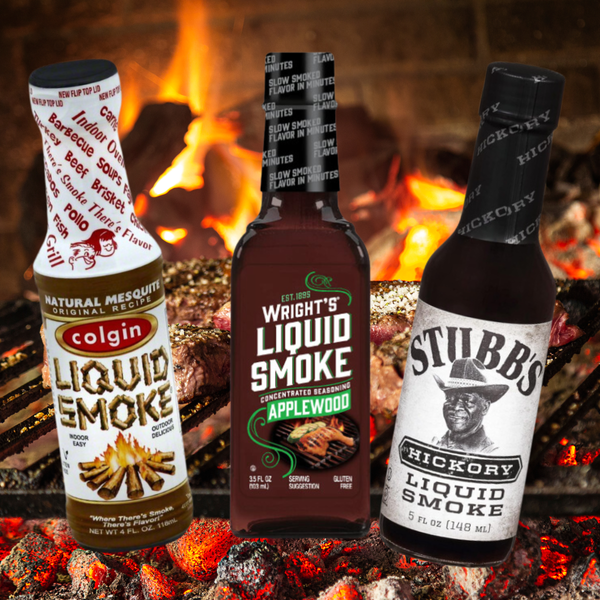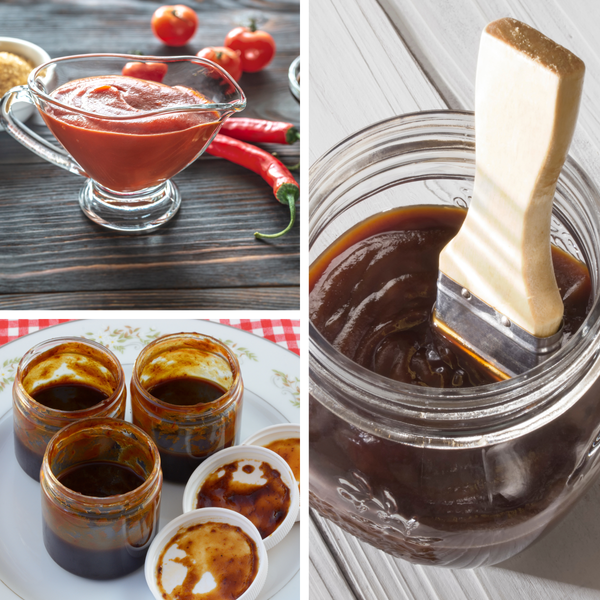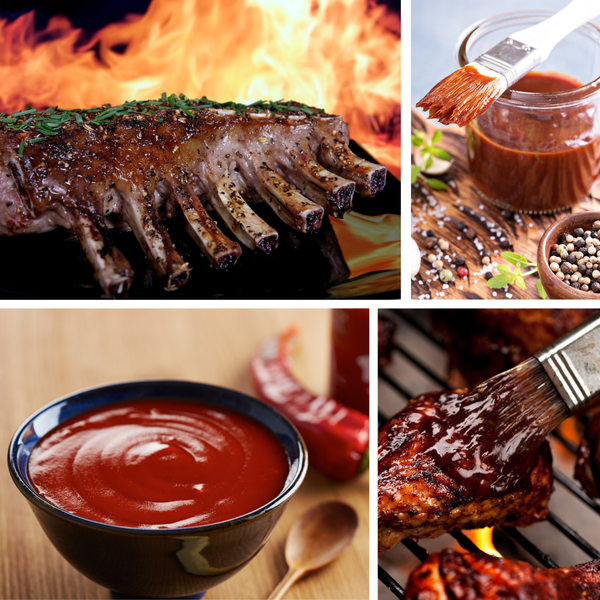Key Takeaways:
- BBQ Sauce vs Dry Rub: Understand the fundamental differences and applications of BBQ sauces and dry rubs.
- Flavor Profiles: Learn how each method enhances the taste of your meats, from sweet and tangy to spicy and savory.
- Cooking Techniques: Discover the best practices for using BBQ sauces and dry rubs to achieve mouth-watering results.
Introduction
The summer is nearly here in the Northeast, and when it comes to grilling, the debate between BBQ sauce vs dry BBQ rub is as old as the hills. Both methods have their ardent supporters, and each brings its unique flair to the table. While this debate mainly centers around making ribs, many barbecue and cookout meats benefit from good seasoning. Whether you're a seasoned grill king or a novice looking to impress at your next grilling night, understanding the nuances of these two flavoring techniques can elevate your BBQ game to new heights.
What is BBQ Sauce?
BBQ sauces are liquid marinades that add flavoring to meats during the smoking and cooking process. They come in various styles, from sweet and tangy to spicy and smoky. The primary ingredients often include tomatoes, vinegar, brown sugar, and a blend of spices. Famous Dave's, for instance, offers a range of signature sauces like the mild buffalo and devil's spit, each providing a unique taste experience.
The beauty of BBQ sauces lies in their versatility. You can use them as a marinade to tenderize meat, a basting sauce during cooking, or even as a dipping sauce at the very end. The sweet and tangy flavor of a good barbecue sauce can make pulled pork or pork ribs an unforgettable dish. Plus, making your own BBQ sauce allows you to customize the flavor profile to suit your personal preference.

What is a Dry Rub?
BBQ dry rubs refer to a spice blend that is rubbed onto the meat before cooking. These rubs typically include ingredients like salt, black pepper, chili powder, and brown sugar. The technique seasons the meat's exterior, creating a flavorful crust that locks in the juices inside. Unlike BBQ sauces, dry rubs do not add moisture but instead rely on the meat's natural juices to create a delectable inside.
Rubbing dry spices onto meats is a technique favored by many experienced grillers. It’s particularly effective for smoking meats, as the dry heat helps to develop a nice crust while the flavor trickles inside. BBQ rubs are perfect for those who prefer a more straightforward, less messy approach to flavoring their meats.
Flavor Profiles: Sweet and Tangy vs. Spicy and Savory
BBQ sauces often bring a sweet and tangy flavor to the table, thanks to ingredients like brown sugar and vinegar. This makes them ideal for marinated meats flavored with a rich, caramelized glaze. On the other hand, dry rubs offer a more concentrated burst of flavor, with spices like chili powder and black pepper providing a spicy and savory kick.
For example, a slow-cooked pulled pork might benefit from a sweet and tangy BBQ sauce that complements the meat's natural richness. Conversely, pork ribs with a spicy dry rub can offer a more intense, smoky flavor that stands up well to the slow smoking process. Both methods have their merits, and the choice often comes down to personal preference.
Exploring BBQ Wet Rubs and Liquid Marinades
BBQ wet rubs are a fantastic way to infuse your meat with deep, rich flavors. Unlike dry barbecue rubs, wet rubs combine spices with a liquid marinade component, creating a paste that clings to the meat. This method is perfect for those who love the intense taste of spices but want the added moisture that a wet rub provides. Famous Dave's offers a variety of wet rubs that can transform your grilling experience, making your meat succulent and flavorful.
Liquid marinades are another excellent option for adding depth to your grilled dishes. Marinades add flavor by soaking into the meat, breaking down fibers, and making it tender. Whether you prefer a mild buffalo devil's spit or a more traditional marinade, these liquid concoctions can elevate your grilling game. Marinades help to not only tenderize but also infuse the meat with additional flavor, making every bite a delight.

The Role of Sauces and Toppings in Grilling
Sauces add flavoring to your grilled meats, creating a delicious outer layer that complements the internal seasoning. Whether you opt for a tangy BBQ sauce or a spicy buffalo sauce, the right sauce can make all the difference. Even our toppings, like caramelized onions or grilled peppers, can enhance the overall taste and presentation of your dish. The key is to find the perfect balance that suits your palate.
Toppings are not just for decoration; they add an extra layer of flavor and texture to your grilled creations. Think of three toppings that can transform a simple grilled chicken into a gourmet meal: crispy bacon, melted cheese, and fresh avocado slices. These additions can turn your BBQ into a culinary masterpiece, making your food stand out at any gathering. So, don't be afraid to experiment with different sauces and toppings to find your ultimate flavor combination.
Cooking Techniques: Slow Cooking vs. Quick Grilling
The cooking technique you choose can significantly impact the effectiveness of BBQ sauces and dry rubs. BBQ sauces are often best suited for slow cooking methods like smoking or braising. The slow heat allows the sauce to penetrate the meat, creating a tender, flavorful dish. For instance, slow-smoked ribs basted with a sweet and tangy BBQ sauce can be a showstopper at any BBQ business or food stand.
On the flip side, dry rubs excel in quick grilling or pan-frying scenarios. The high heat helps to create a crispy outside while keeping the juices inside. This makes dry rubs ideal for grilling night when you need to whip up something delicious in a short amount of time. The spice blend forms a crust that not only adds flavor but also helps to seal in the meat's natural juices.
The One-Two Combo: Using Both BBQ Sauce and Dry Rub
Why choose between BBQ sauce and dry rub when you can have the best of both worlds? Many experienced grillers swear by the one-two combo of using a dry rub first and then finishing with a BBQ sauce. This technique allows you to build layers of flavor, starting with the concentrated spices of the rub and ending with the sweet and tangy glaze of the sauce.
For example, you might start by rubbing a spice blend onto your pork ribs and letting them sit for several hours to absorb the flavors. Then, during the last 30 minutes of cooking, you can brush on your favorite BBQ sauce to create a caramelized, flavorful crust. This method offers the best of both worlds, ensuring that your meat is both flavorful and tender.

DIY: Making Your Own BBQ Sauce and Dry Rub
Creating your own BBQ sauce and dry rub allows you to tailor the flavors to your liking. For a basic BBQ sauce, you can start with a base of ketchup, vinegar, and brown sugar, then add spices like garlic powder, onion powder, and paprika. Adjust the sweetness and tanginess to suit your taste, and don't be afraid to experiment with additional flavors like honey or mustard.
For a simple dry rub, combine salt, black pepper, chili powder, and brown sugar. You can also add other spices like cumin, garlic powder, and smoked paprika to create a more complex flavor profile. The key is to find a balance that complements the meat you're cooking. Whether you're making pulled pork, pork ribs, or even chicken, a well-crafted dry rub can make all the difference.
Practical Tips for Using BBQ Sauce and Dry Rub
When using BBQ sauce, it's essential to apply it at the right time. Adding the sauce too early can cause it to burn due to its high sugar content. Instead, wait until the last 15-30 minutes of cooking to brush on the sauce. This will give it enough time to caramelize without burning, creating a delicious glaze.
For dry rubs, the prep stage is crucial. Pat the meat dry with a paper towel before applying the rub to ensure it adheres properly. Let the meat sit for at least an hour, or even overnight, to allow the flavors to penetrate. This will help to create a flavorful crust that enhances the overall taste of the meat.
Summary
In the great BBQ sauce vs dry rub debate, there is no one-size-fits-all answer. Both methods offer unique advantages and can be used in various ways to create mouth-watering dishes. Whether you prefer the sweet and tangy flavor of a BBQ sauce or the concentrated spices of a dry rub, understanding how to use each technique can help you become a true grill king.
FAQ
Q: Can I use both BBQ sauce and dry rub on the same meat?
A: Absolutely! Many grillers use a dry rub first and then finish with a BBQ sauce to build layers of flavor.
Q: How long should I let the dry rub sit on the meat?
A: For the best results, let the dry rub sit for at least an hour, or even overnight, to allow the flavors to penetrate the meat.
Q: When should I apply BBQ sauce during cooking?
A: Apply BBQ sauce during the last 15-30 minutes of cooking to prevent it from burning and to create a delicious glaze.










